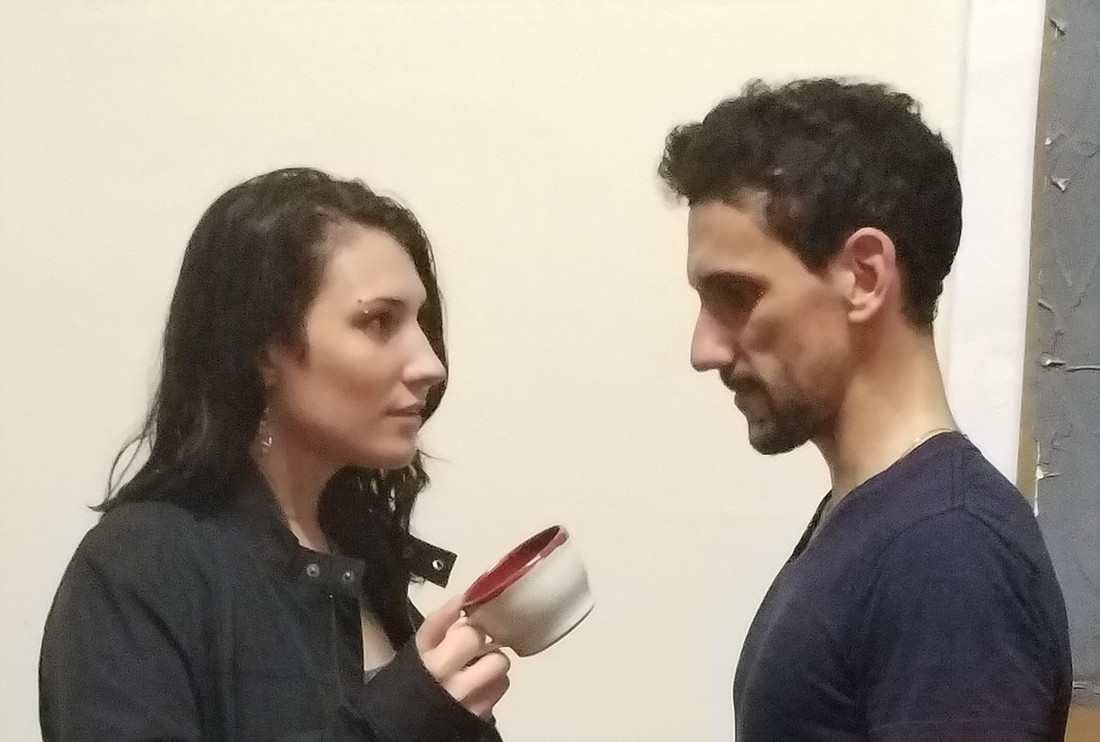Review of Love Song, New Haven Theater Company
The bond between siblings gets an interesting and amusing rendering in John Kolvenbach’s Love Song, in a production by New Haven Theater Company, co-directed by Margaret Mann and John Watson. Beane (Christian Shaboo) seems bipolar, leading a lonely existence in a shabby room. His successful sister, Joan (Susan Kulp), likes sounding off to her husband Harry (George Kulp) about “nincompoops” and incompetent interns at the office, while swilling large wine pours. Harry has a detached complacency, playing devil’s advocate against his wife’s peremptory judgments because “that’s what conversation is.” Beane suddenly appears in their elegant living room and agrees to subject himself to some kind of psychological evaluation Harry pulled, Joan claims, from Cosmo or the like. Soon, the way Beane’s mind works becomes a source of considerable amusement for the audience and a matter of some consternation between the fractious couple.
Beane’s encounter with Molly (Jo Kulp) turns his world upside down. His manic side becomes very much evident as he nearly hyperventilates over a turkey sandwich while at lunch with Joan and engages his waiter (a bemused Erich Greene) with varied queries. The highpoint—a peak for both the play and Beane—arrives when Beane sings the praises of sex and Molly, inspiring a bout of amorous cooing between Joan and Harry. Shaboo—who once played a would-be cult leader in Drew Grey’s The Cult at NHTC—capably takes the energy up a notch and becomes almost rapturous. It’s here that Love Song lives up to its title, with Kolvenbach creating a truly lyrical language for Beane’s flight.
Molly (Jo Kulp) and Beane (Christian Shaboo) in New Haven Theater Company’s production of Love Song
We expect a crash and, sure enough, it comes, but not before we get a wonderful scene of middle-aged lovers rediscovering the spark through playing hooky, role-playing, and becoming enamored with being in love. The Kulps do a fine job of transforming Joan from a workaholic to a borderline alcoholic to a sex kitten, while Harry shows off his knack for fun while also retaining his essential Harryness. It’s a centerpiece matched by a scene between Molly and Beane that takes off in a somewhat different direction, a shared fantasy of meeting naked in the pond in a park, that—perhaps—tries a bit too hard to become poetic but which Shaboo and Kulp orchestrate with spellbinding rhythms.
A late scene between Beane and Joan lets us see what’s been at stake all along. Describing the scene would no doubt make it sound creepier than it is, but Joan’s monologue to Beane takes stock of the arc we’ve traveled. Joan and Beane—neither of whom might be fully wound—share a kind of symbiotic relation that works because Joan keeps Beane in reality just enough, while Beane helps Joan feel the thrill of what lies beyond the safe boundaries. As Molly said earlier, in a toast with Beane, “here’s to the end of literalisms.” A cup, in other words, isn’t just a cup.
Kolvenbach wants to imagine a world where love and passion can illuminate mundane lives with the feeling of flight and freedom. The catalyst might be a glimpse of someone different, or it may involve a sustained fantasy of the ideal soul mate who knows what you could never say. As Molly, Jo Kulp provides much of the spirit here; she’s as demanding in her way as Joan, but also full of an outsider’s sense of purpose, even at times dangerous. Her contempt for the sentimental closets where most people have squirreled away their keepsakes of identity and for the pretensions of minimalists are darkly pointed. When her vision infuses itself into Beane’s naïve outlook it remakes the world for him, and that in turn stretches his sister’s—and perhaps the viewer’s—sense of possibility.
With its set divided between Joan’s and Harry’s comfortable living room and Beane’s derelict room, Love Story even looks bipolar. The soundtrack of musical selections is apt and enjoyable, and the light/sound cue that creates a significant oppression in Beane’s room is handled quite effectively. All in all, there’s a lot to love about Love Song, not least the company’s way with the lyricism and bite of Kolvenbach’s script, the Kulp family’s engaging spirit, and Shaboo’s haunted disconnect from the normality we prize even as it kills us slowly with boredom.
Love Song
By John Kolvenbach
Directed by Margaret Mann and John Watson
Cast: Erich Greene, George Kulp, Jo Kulp, Susan Kulp, Christian Shaboo
New Haven Theater Company
November 8-10 & 15-17, 2018



